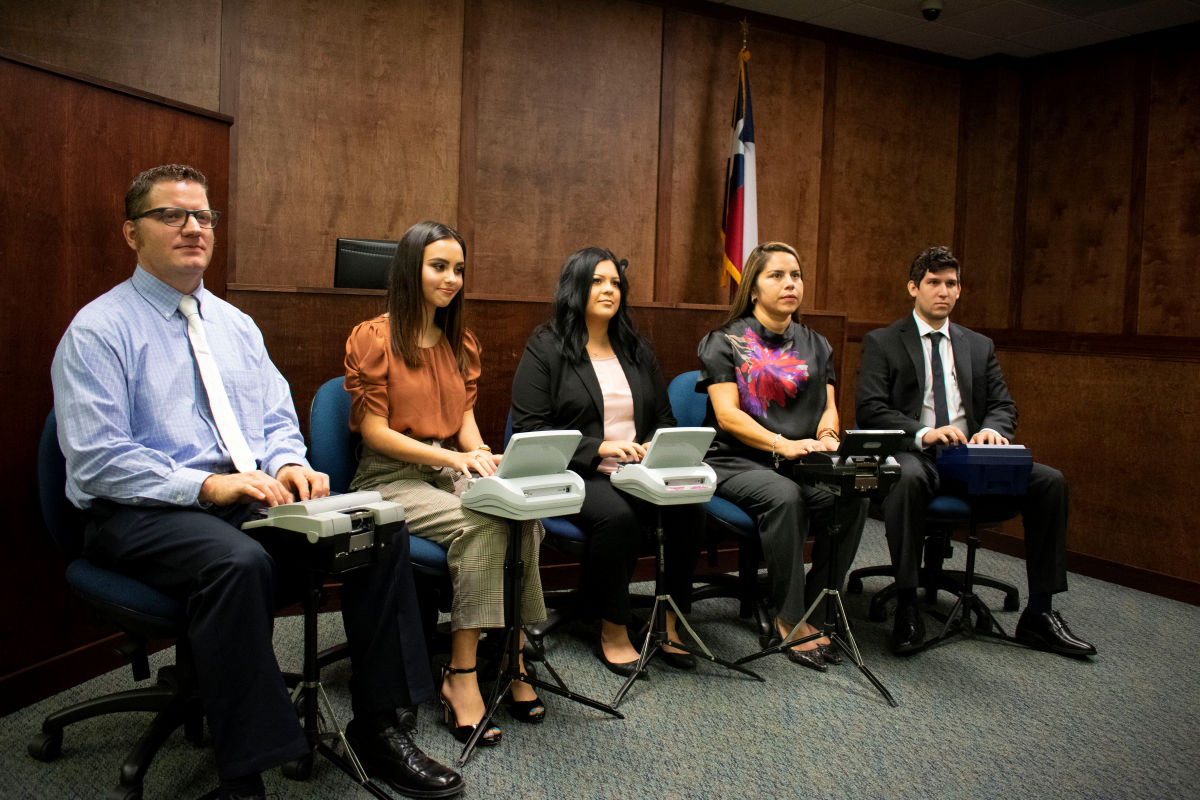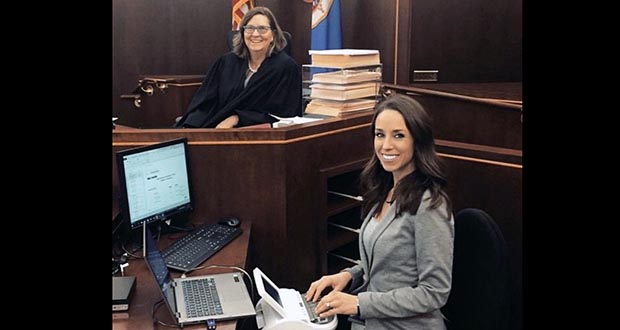Durham court reporting and legal ethics: standards explained
Understanding Court Reporting: An Overview of Its Duty in the Legal Process
Court reporting is an essential part of the legal system. It ensures that every spoken word during depositions and tests is precisely recorded. This transcription supplies a reputable document for future recommendation. Court press reporters possess specialized abilities and have to browse various modern technologies. durham court reporting. As the lawful landscape evolves, so as well does the function of these specialists. Comprehending their impact raises essential questions regarding the future of legal paperwork and liability
The Relevance of Accurate Transcription in Legal Proceedings

Accurate transcription plays an important duty in legal proceedings, working as the foundation for justice and responsibility. Stenotype reporter, tasked with recording spoken discussion during tests and depositions, assure that every word is recorded with accuracy. This transcription comes to be an important document, permitting courts, judges, and attorneys to assess the proceedings precisely. Errors or noninclusions in transcription can bring about misconceptions, false impressions, and possibly unjust outcomes.
These transcripts offer as main records that can be referenced in future lawful actions, allures, or scholarly evaluations. The honesty of the judicial process relies greatly on the reliability of these documents. The ability to offer a clear, verbatim account of arguments and testaments is important in promoting the rule of legislation. The value of precise transcription can not be overstated; it is vital for guaranteeing reasonable trials and preserving public trust in the legal system.
The Skills and Qualifications of Court Reporters
While the function of a stenotype reporter is necessary in the legal system, it needs an one-of-a-kind set of credentials and skills to ensure effective efficiency. Effectiveness in shorthand or voice writing is needed, enabling reporters to capture talked language accurately and effectively. In addition, a solid grip of legal terms and treatments is necessary, as stenotype reporter should understand intricate conversations that happen throughout tests and hearings.
In addition, attention to information and phenomenal listening skills are essential to guarantee exact records. Numerous court press reporters have certification from certified programs, which commonly consist of strenuous training in transcription techniques and legal values. Solid interpersonal abilities also play a substantial duty, as press reporters frequently engage with witnesses, lawyers, and courts. Eventually, the combination of technological proficiency, lawful understanding, and interpersonal capacities outfits court reporters to satisfy their responsibilities successfully within the judicial system
Various Sorts Of Court Reporting Providers
Court reporting services include a range of specialized features tailored to satisfy the demands of the lawful system. One popular type is deposition reporting, where stenotype reporter record witness testimonies outside of court setups, usually for use in trials. Another service is real-time reporting, which provides instantaneous transcription during procedures, making it possible for attorneys to accessibility live message feeds. Additionally, some stenotype reporter provide transcription of sound and video recordings, ensuring accurate paperwork of occasions.
Shut captioning services are also provided, making lawful proceedings accessible to people with hearing problems. In addition, many court reporting companies concentrate on serving certain legal areas, such as family regulation, criminal legislation, or company regulation, thus offering customized competence. Lastly, some reporters might give video clip deposition services, which enhance the documents process via visual context. Each kind of solution plays an important function in ensuring the accuracy and stability of legal documents.
The Technology Behind Modern Court Reporting
Modern court reporting depends greatly on innovative innovation to boost precision and performance. Stenography equipments, digital recording techniques, and real-time transcription software application are important parts of this area. These tools not just assist in the transcription process but likewise assure that lawful proceedings are recorded with accuracy.
Stenography Machines Explained
Stenography equipments act as the foundation of contemporary court reporting, transforming talked words right into created message with remarkable efficiency. These specialized tools use a special key-board format that permits court press reporters to type syllables and words phonetically, allowing them to record dialogue at high rates. Making use of shorthand signs indicates that reporters can record discussions in actual time, ensuring exact documents of lawful process. Stenography devices are geared up with sophisticated innovation, consisting of software that can equate stenographic notes right into legible message. This combination of software and hardware substantially improves the speed and accuracy of court reporting, making it an indispensable device in the legal area. Therefore, stenography stays a vital ability for professionals in the courtroom.
Digital Recording Techniques
Developments in technology have actually broadened the devices available for court reporting past conventional stenography makers. Digital videotaping methods have arised as a trustworthy choice, catching audio and video of legal process with high fidelity. These systems make use of microphones and tape-recording tools strategically positioned to guarantee clarity and lessen history noise, providing a comprehensive record of discussions and testimonies. The tape-recorded content can be repeated for precision throughout transcription, enabling stenotype reporter to validate details efficiently. Furthermore, electronic recordings can be saved securely for future referral, boosting access and maintaining the stability of the lawful procedure. As courts accept these contemporary technologies, electronic recording techniques play a progressively crucial function in preserving precise and effective paperwork.
Real-Time Transcription Software Program
As court rooms progressively embrace modern technology to boost the lawful process, real-time transcription software has actually ended up being a vital tool for court reporters. This cutting-edge innovation enables court press reporters to record talked dialogue promptly, providing prompt accessibility to exact records during proceedings. By converting spoken words into message as they are spoken, real-time transcription software facilitates efficient interaction between lawyers, judges, and other court participants. The software application often incorporates with court room audio systems, making sure that every word is recorded with accuracy. Additionally, it can create transcripts for review and circulation, streamlining the documents process. Consequently, real-time transcription software not only enhances the effectiveness of court reporting however likewise improves the general availability of legal process.
The Duty of Court Reporters in Keeping Court Room Stability

Court reporters contribute to the openness of the judicial process. By delivering detailed transcripts, they enable the public and media to access court process, cultivating liability. Their existence in the courtroom additionally helps keep decorum, as their actions emphasize the severity of the legal process.
Along with technological skills, stenotype reporter must show professionalism and impartiality, necessary for protecting the honesty of the judicial system. Ultimately, their thorough initiatives support fair test legal rights and enhance public self-confidence in the legal structure.
The Future of Court Reporting in an Evolving Legal Landscape
As the legal landscape develops, court reporting deals with substantial adjustments driven by technical improvements and an click resources expanding shift in the direction of remote services. These growths are improving just how stenotype reporter run, affecting both the rate and precision of lawful paperwork. The future of this occupation will likely hinge on its flexibility to these arising trends.
Technical Innovations Impacting Reporting
Many technical improvements are reshaping the landscape of court reporting, ushering in a brand-new era of efficiency and accuracy. Digital recording systems have actually come to be commonplace, enabling accurate audio capture during process. These systems usually incorporate with transcription software, promoting faster turn-around times for transcripts. Furthermore, man-made intelligence is playing a significant function in improving the transcription procedure, with speech acknowledgment innovation aiding press reporters in generating a lot more precise documentation. Additionally, cloud-based storage space remedies enhance availability, allowing lawful professionals to obtain and share transcripts easily. As these innovations continue to progress, they promise to additional transform the court reporting occupation, enhancing the general lawful process while maintaining high requirements of professionalism and honesty.
Shift In The Direction Of Remote Services
The legal landscape is significantly embracing remote solutions, reshaping exactly how court reporting is carried out. This shift has been sped up by technical innovations and the requirement for adaptability throughout current worldwide events. Court press reporters now use video clip conferencing platforms to facilitate hearings and depositions, allowing for better accessibility and performance. Remote services make it possible for participation from different areas, lowering travel prices and logistical challenges. Additionally, electronic transcription tools boost accuracy and improve the documentation procedure. As the legal market adapts, court Learn More reporters are needed to establish new abilities and familiarize themselves with emerging innovations. This advancement provides both possibilities and obstacles, pushing the occupation towards an extra integrated, technology-driven future while keeping its core dedication to delivering accurate and reputable lawful documentation.

Often Asked Inquiries
Exactly How Much Do Court Reporters Usually Gain Annually?
Court press reporters normally make in between $50,000 and $100,000 every year, depending on experience, place, and the demand for services. Specialized qualifications or skills can additionally increase their earning capacity in numerous lawful settings.
What Is the Ordinary Period of Court Reporting Training Programs?
Court reporting training programs commonly last in between 18 months to 2 years. This period differs based on the organization and the particular curriculum, including both theory and sensible abilities important for striving stenotype reporter.
Can Court Reporters Work Remotely for Legal Process?
Yes, stenotype reporter can function from another location for lawful proceedings, making use of technology to transcribe audio and video feeds. This adaptability allows them to give accurate documentation while preserving the stability of the lawful process.
What Is the Distinction Between a Court Reporter and a Stenographer?
A stenotype reporter focuses on transcribing legal proceedings, while a stenographer focuses on shorthand creating for different contexts, consisting of meetings and meetings. Both duties include capturing talked words however vary in their certain applications and environments.
Are Court Reporters Required to Have Licenses or accreditations?
Yes, stenotype reporter are commonly required to obtain licenses or accreditations. These qualifications guarantee they possess the essential skills and knowledge to accurately transcribe legal process, preserving the integrity of the judicial procedure.
Several court press reporters possess qualification from accredited programs, which frequently consist of rigorous training in transcription techniques and legal principles. One noticeable type is deposition reporting, where court reporters record witness testimonies outside of court settings, typically for use in trials. As court rooms progressively embrace technology to improve the legal process, real-time transcription software program has become an essential device for court reporters. Yes, court press reporters can function remotely for legal procedures, making use of modern technology to transcribe audio and video clip feeds. A court reporter specializes in transcribing lawful process, while a clerk focuses on shorthand writing for different contexts, consisting of conferences read the full info here and seminars.